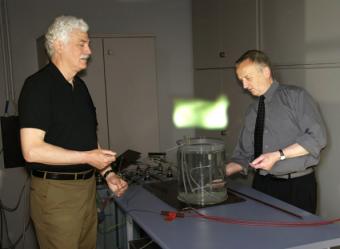but popping ball lightning (or at least ball lightning like plasma clouds). These are generated by an underwater discharge of a lousy 60 Ampere (so not for pocket use). Experiment (and image) are from Max-Plack-Institute für Plasmaphysik (german). An englisch translation is available at physorg.com.
posted by timh
on Saturday, June 17th, 2006 at 7:42 pm // 3d, physics, visualization.
// RSS 2.0 feed
// leave a response // trackback //
The below box is for leaving comments. Interesting comments in german, french and russian will eventually be translated into english. If you write a comment you consent to our data protection practices as specified
If your comment text is not too rude and if your URL is not clearly SPAM then both will be published after moderation. Your email adress will not be published. Moderation is done by hand and might take up to a couple of days.

June 17th, 2006 at 9:37 pm
there is actually an interesting link, relating this project to the previous blog-entry.
Thanks to Alvaro for pointing it out to us! It was probably originally on the physorg.com
blog however I found that link first (to my astonishment :)) on the blog of a popular french graphiste :) (my guess is that he got it from interactivearchitecture.com where I
think it was posted by Usman Haque ? (the blog entry is unfortunately destroyed at the moment due to provider problems)
Annoyingly I actually couldnt find papers about this project on the website of Keio University! The physics behind it is not so new, however I could imagine
that there are technological problems (the mirrors?!?!) so that I couldnt find another example of that kind.
P.S.
or may be dr0p was reading physorg.com?!?!?
October 19th, 2019 at 11:51 am
I accidentally surfed here to this “historical randform post” (which was linked to from your post about more or less un-conventional approaches to nuclear fusion like in particular cold fusion), because I am also interested in unconventional approaches to fusion science. Did you notice that there were successful experiments with aneutronic fusion, like with hydrogen-boron fusion? These may mitigate eventually upcoming problems of d-T fusion due to Lithium shortages.